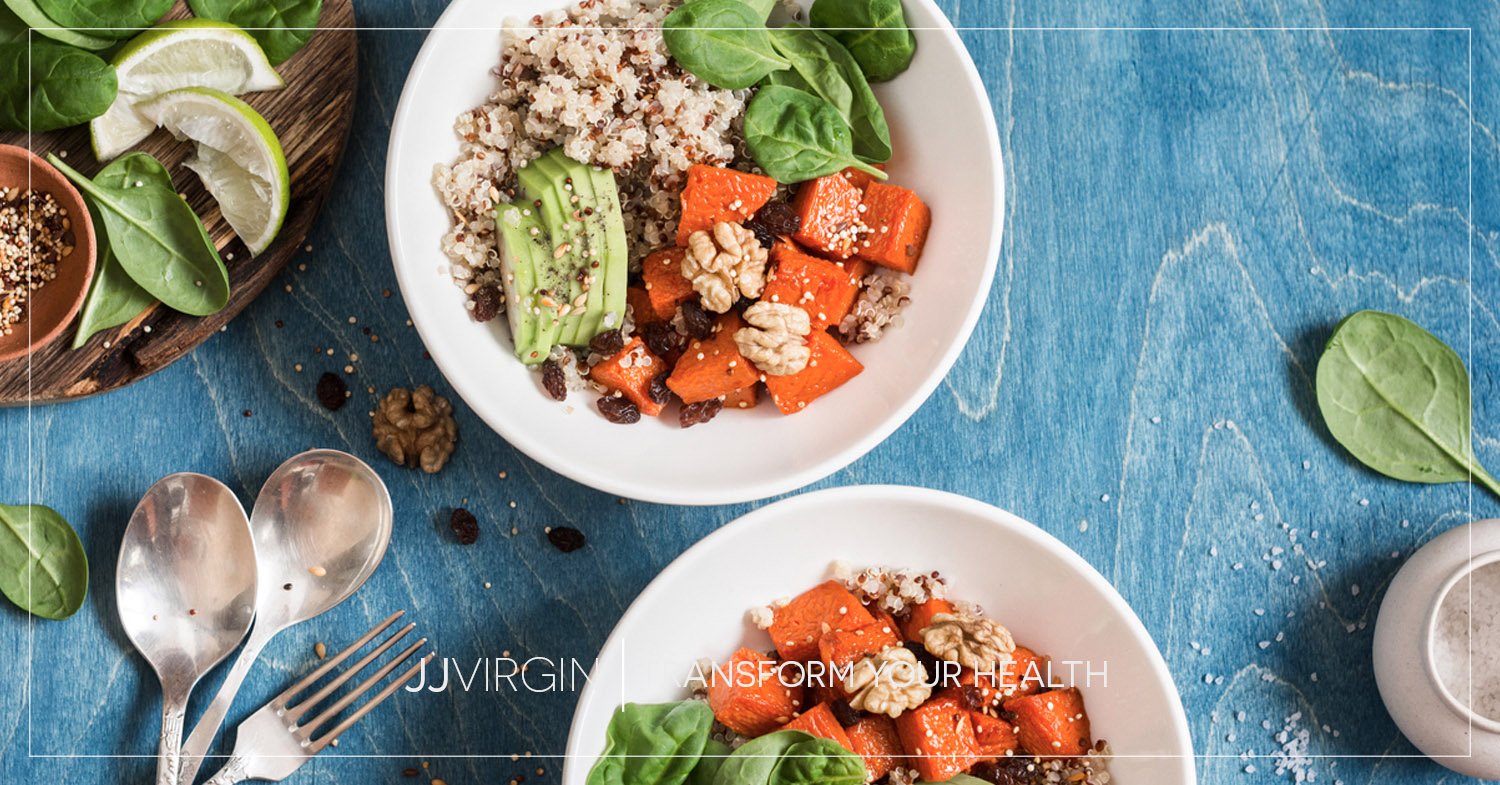Going plant-based? Smart vegans and vegetarians know it’s not enough just to cut animal products out of your diet and eat as you did before!
When you leave out animal-based foods, it’s vitally important to plan smart, balanced meals. Vegans and vegetarians are at risk for a number of potentially life-threatening vitamin deficiencies, not to mention missing out on nutrients that are vital to great energy and lower risk of disease.
So let’s do it right! Here are some easy tips to modify your vegan or vegetarian meals for maximum health and wellness…
1. Make Non-starchy Veggies the Focal Point of Your Meals
First, load your plate with non-starchy veggies. No, these don’t count towards your protein quota, but you’ll be getting filling fiber and a rich array of nutrients when you add, say, cauliflower and spinach.
2. Good Fat is Your Friend
Second, get some healthy fats on your plate. Contrary to what 1980s dieting gurus taught us, you need fat to burn fat! (Find out more about the low-fat myth in this quick video.)
Drizzle extra virgin olive oil on your cauliflower and sauté your spinach in coconut oil and garlic. Add some slivered almonds to your green beans.
Avocado is also an amazing source of monounsaturated fat and fiber, so add it to your menu liberally! Here’s my Top 8 Avocado Recipes to make it easy…
3. Mind Your Omega-3 Intake
Omega-3s are vital to your brain and heart health, as well as fighting inflammation and aging. (Find out more with this quick read: What Are Omega-3s and Why Do You Need Them?)
Because you won’t be eating fish, throw some raw walnuts into your salad or sprinkle freshly ground flaxseed on your veggies. You can also add berries and spinach to your morning smoothies to get more omega-3s.

4. Get Plenty of Clean Protein
Many packaged vegetarian foods are loaded with inflammatory ingredients, including gluten, soy, and sweeteners. Don’t fall for the meatless trap: substituting highly processed meal-alternatives for animal protein will only harm your health.
In fact, during my time as health expert on Dr. Phil, one of my most memorable clients was a vegetarian who lost over 100 pounds simply by eliminating soy from her diet! Because you’re not eating animal foods, you need to consider your protein sources carefully.
Breakfast is easy: just blend up a vegan shake. My Plant-Based All-in-One Protein Shake mixes well with unsweetened coconut or almond milk, berries, flax or chia seeds, avocado, and some kale or other leafy greens. (Grab a free Smoothie Guide with 48 delicious recipes at the end of this blog!)
For other meals, here’s my top recommendations for protein…
Optimal Protein Sources for Vegetarians/Vegans
Lentils – 18 grams protein/cooked cup
Chickpeas – 14.5 grams protein/cooked cup
Pinto, kidney, or black beans – 13-15 grams protein/cooked cup
Amaranth – 9 grams protein/cooked cup
Quinoa – 8 grams protein/cooked cup
Tahini paste – 8 grams protein/3 tablespoon serving
Sesame seeds – 6.5 grams protein/ounce
Flaxseed – 6 grams protein/ounce
Pistachios or almonds – 6 grams protein/ounce
Gluten-free oatmeal – 6 grams protein/cup
Chia seeds – 5 grams protein/ounce
Chlorella – 5 grams protein/tablespoon
Unsweetened almond milk – 5 grams protein/cup
Cashews or walnuts – 4 grams protein/ounce
Spirulina – 4 grams protein/tablespoon
Don’t Forget to Supplement to Stay Healthy
In addition to loading up on non-starchy veggies, healthy fats, omega-3s, and clean sources of protein, all vegans and vegetarians need to supplement in order to stay healthy.
Part of why I don’t typically endorse a plant-based diet is because you literally can’t survive on plants alone; without adding at least a B12 supplement, the resulting deficiency will prove fatal in a matter of years! B-Supreme is what I recommend to ensure you get adequate, bioavailable B12 within a comprehensive B-complex formula. I also highly recommend a quality multivitamin and an algae-based omega-3 DHA/EPA supplement.
Want some fantastic vegan and vegetarian recipes that will help you lose weight, feel amazing, and feel zero deprivation? Check out both of my cookbooks, The Virgin Diet Cookbook and the Sugar Impact Diet Cookbook.
I also share fresh, creative recipes every day on social, so follow me on Facebook and Instagram for plenty of yummy choices!
Thanks so much for reading this post! If you’re interested in finding out more about how to dial in your diet and health, please check out my online programs. They’re science-based and have already helped thousands of people feel better fast and lose the weight.





